Put an End to Missing Teeth… Permanently
While traditional dentures and bridges can replace missing teeth and provide generally good results, these treatments do not address tooth roots. Untreated tooth roots from missing teeth cause continuous jawbone shrinkage, which can create wrinkles and sagging skin – and make you look older.
By securing your restoration with dental implants, you can not only improve your teeth’s durability but also have artificial tooth roots that stimulate the jawbone and promote better overall oral health.
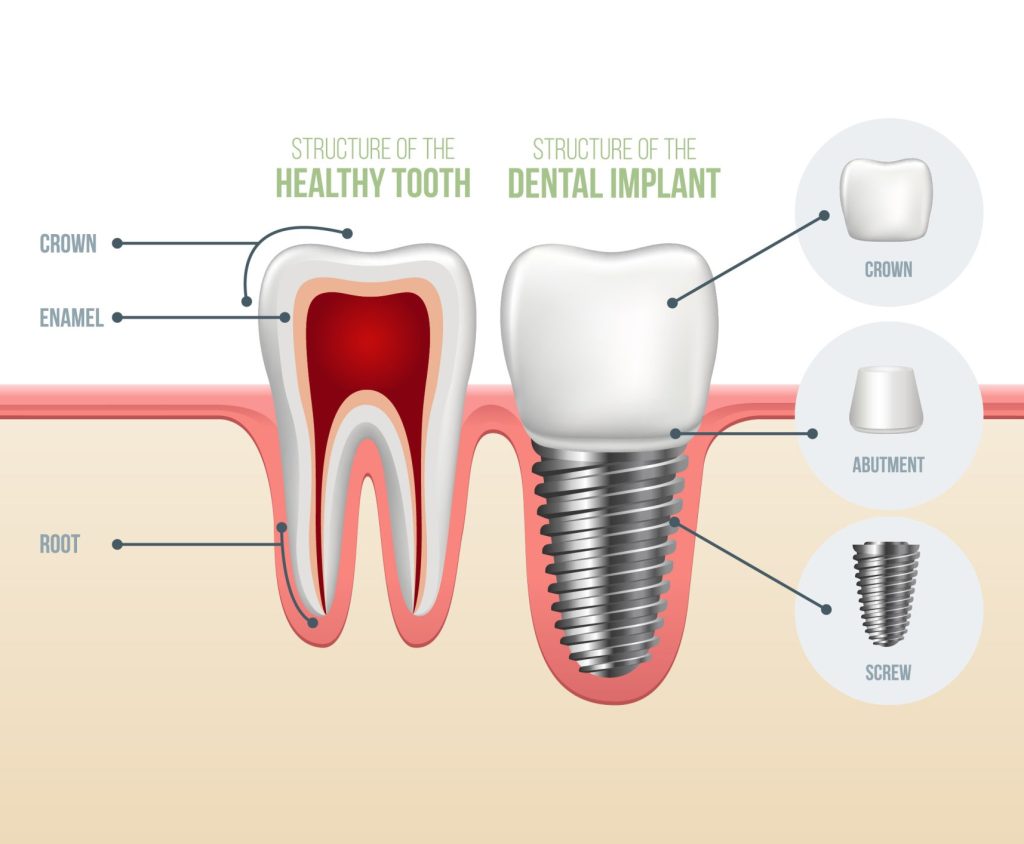
Who Is a Candidate for Dental Implants?
Dental implants can be a good solution if you, or someone you know, is experiencing:
- Single tooth or multiple teeth loss
- Loose or uncomfortable dentures
- Difficulties eating certain foods
- A speech impediment
- Weak, broken, cracked, or decaying teeth
- A shift in teeth
- Sagging or shifting facial features
Find Your Right Fit
While dental implants and dentures can both look and function like natural teeth – as well as address tooth loss – there are clear differences between the two that may help you decide which is your best fit.
The main benefits of dental implants include:
- Implants look and function just like natural teeth.
- Implants can replace single or multiple teeth.
- Implants will allow you to smile with confidence again.
- Implants address missing tooth roots that help preserve facial structure.
- Implants won’t shift or slip in your mouth, which allows you to eat normally.
- Implants address speech impediment issues.
- Implants feel more natural than traditional dentures or partials.
- Implants create a strong foundation for artificial teeth.
- Implants prevent bone deterioration.
- Implants are permanent and can last a lifetime if you take good care of them.
The main benefits of dentures and partial dentures include:
- Dentures are a great affordable solution.
- Dentures look just like natural teeth.
- Dentures can replace single or multiple teeth.
- Dentures will allow you to smile with confidence again.
- Dentures provide the correct support for cheeks and lips and help reduce wrinkles.
- Dentures allow patients to eat a greater variety of foods.
- Dentures address speech impediment issues.
- Dentures are the least invasive option to replace missing teeth.
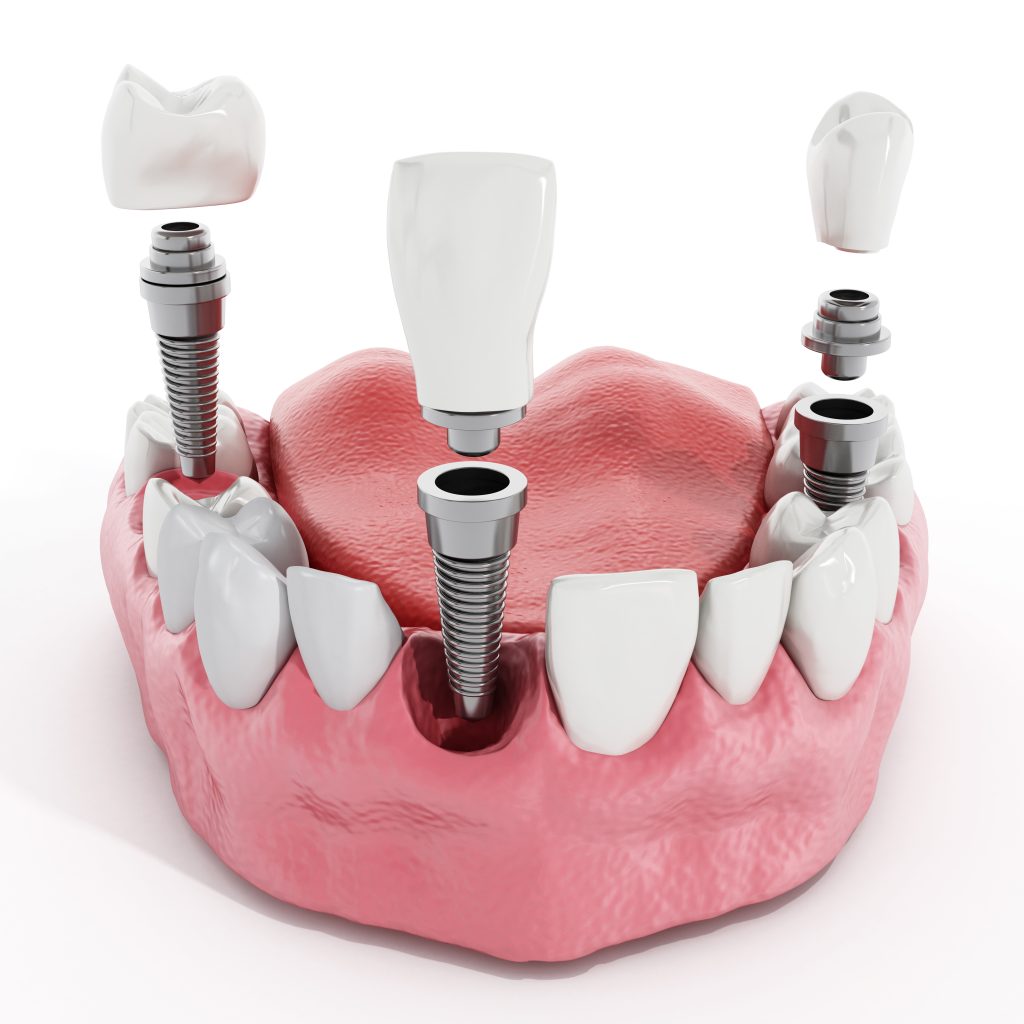
Single or Multi-teeth Dental Implants
Increasingly becoming the gold standard for tooth replacement, dental implants are a great permanent solution because they replace missing teeth roots. Dental implants are artificial tooth roots that connect to the jawbone, providing a long-term base for secure, stable, and comfortable tooth replacement. They are a popular and effective long-term solution for people who suffer from weak teeth, missing teeth, or chronic dental problems. A single tooth implant is a stand-alone unit that does not affect or require treating the teeth next to it, unlike traditional removable bridges. Dental implants are topped with luminous crowns that match the shade of the rest of your smile. Our dental implants start at $89/month with approved credit.
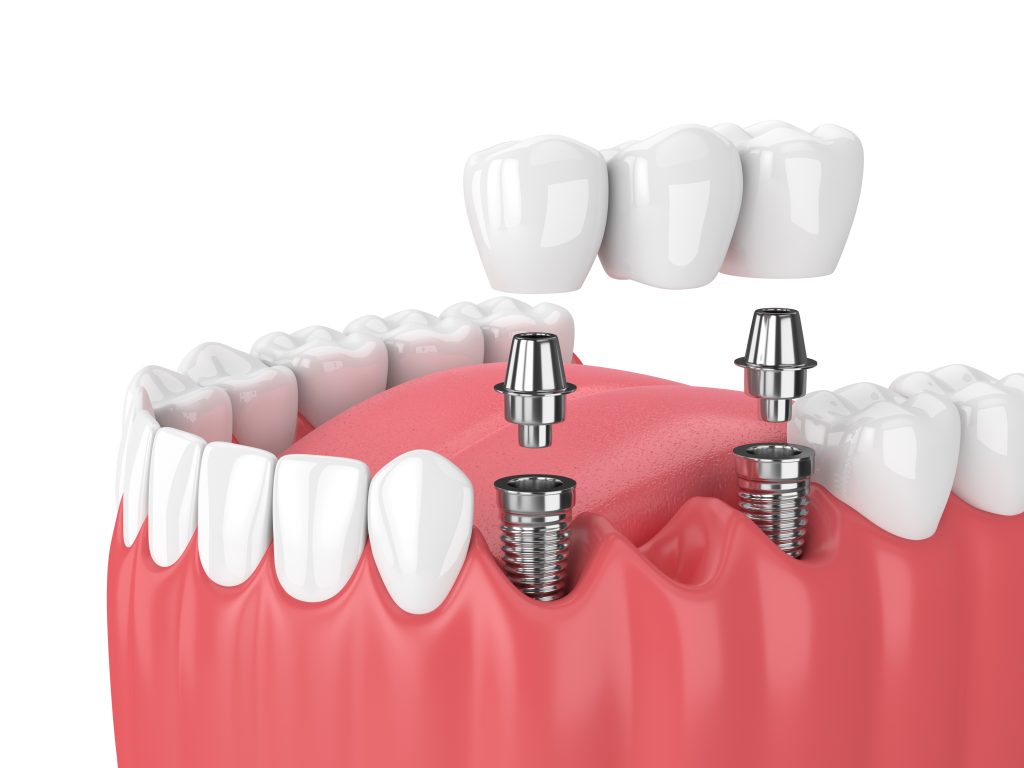
Implant-supported Bridge
An implant-supported bridge is a great solution for patients missing a few teeth. This option replaces the missing teeth and some of the tooth roots. Unlike traditional bridges, implant-supported bridges do not require the support of the teeth next to them. The price of an implant-supported bridge can vary significantly depending on the number of missing teeth. For starting prices, book your initial consult.
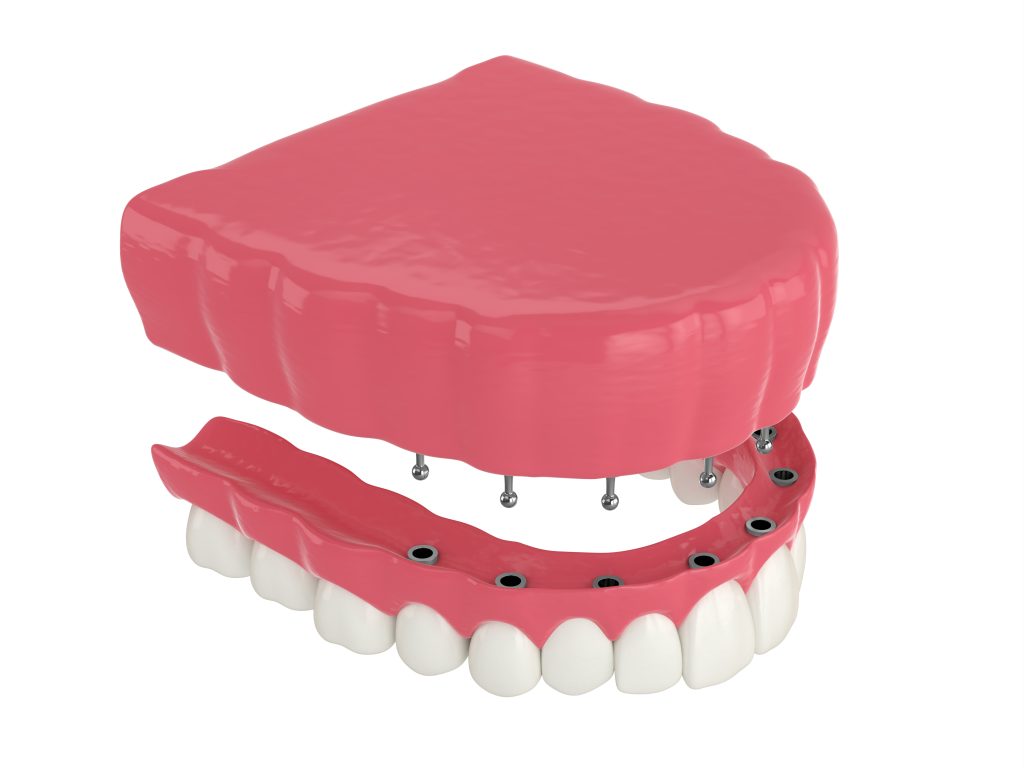
Implant-supported Dentures (Overdentures / Snap-on Dentures)
Implant-supported dentures offer an alternative that is far more stable than traditional dentures. These are more effective at disguising lost gum tissue in an attractive way and help retain bone mass, whereas patients who wear conventional dentures can experience weakening jawbones.
Implant-supported dentures are a great option for patients who are missing a full row of teeth. These are a popular treatment type for patients looking for a fixed solution to missing teeth but cannot afford the price of traditional dental implants. Our implant-supported dentures start at $381/month with approved credit.
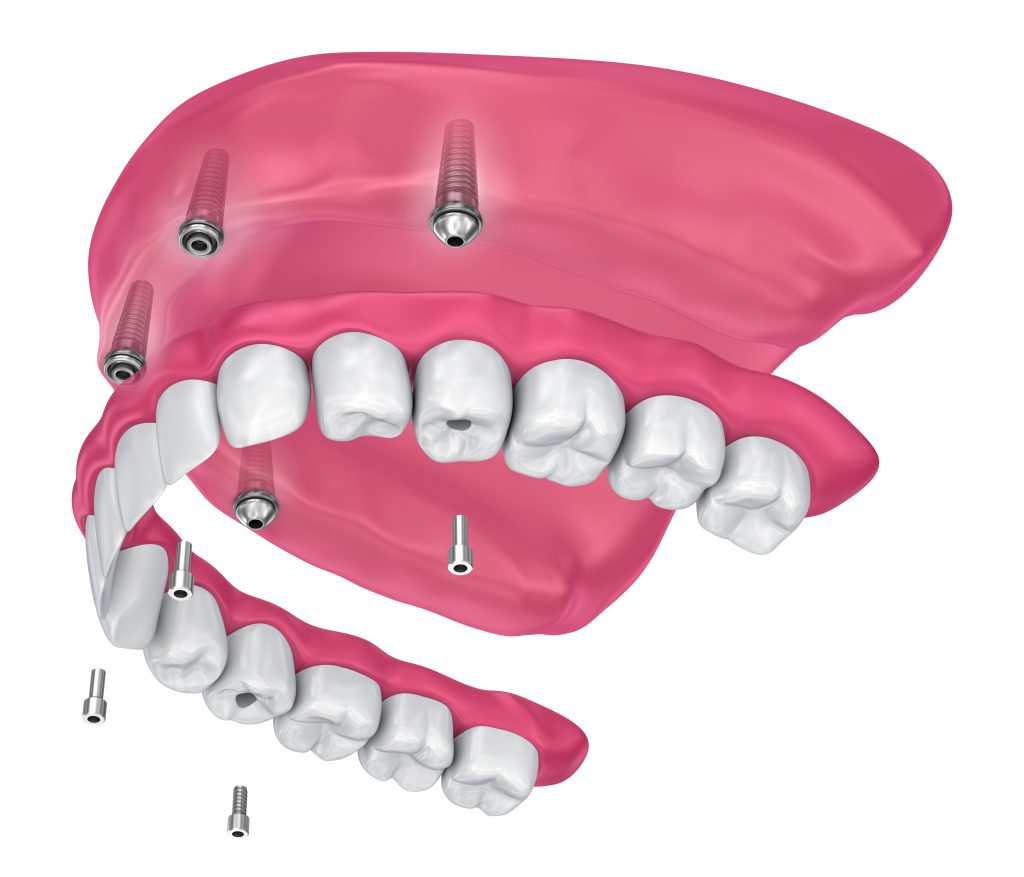
Full-arch Permanent Implants
Full-arch permanent implants are a significantly beneficial solution for patients who are missing all of their teeth. This option allows patients to smile confidently once again and provides the ability to eat comfortably with full biting force. If you miss eating steak, apples, and corn on the cob, full-arch implants are the solution for you.
The new permanent teeth are supported by titanium posts placed into your jawbone during surgery. Once the posts have fused with your jawbone, an abutment can be placed, which allows you to place your new set of teeth. As little as 4 to 6 implant posts can be used to replace up to 14 teeth.
There are many reasons to consider full-arch dental implants, such as:
- The dental implant is stable and comfortable.
- When properly cared for, full-arch dental implants can last a lifetime.
- The dental implant helps you regain the ability to eat anything comfortably again.
- Full-arch implants can keep you looking younger. Implants prevent jawbone shrinkage that often results from missing teeth and makes you look older.
Our full-arch permanent implants start at $555/month with approved credit.
Dental Implants FAQs
Exceptional Dental - Screw vs. cemented implants
While the dental implant is the same for both, the way that the crown is attached to the implant can either be cemented or screwed. Dr. Foster discusses more in detail here.
Have more dental implant questions? Contact any of our Louisiana or Mississippi locations here: https://exceptionaldentalofla.com/services/implants/
Exceptional Dental - Implants In a Day
Yes, dental implants can really be done in one day depending on certain factors like health history, bone quality, bone density, and angulation of implants.
Want to know if you're a candidate? Contact any of our Louisiana or Mississippi locations today: https://exceptionaldentalofla.com/services/implants/
Exceptional Dental - Are Dental Implants Safe?
Yes! Dental implants are safe AND predictable. Research shows over 90% success rates with dental implants.
Do you have more questions? Leave a comment below or visit us here: https://exceptionaldentalofla.com/services/implants/
Who is an ideal candidate for dental implants?
Dental implants are best for patients who are in general good health and have enough jawbone to support the implants. The best way to know if you’re a good candidate is to come in for a consultation and let our doctors examine you. But we’ll reveal a little secret: Almost any patient with missing teeth is a candidate, and we can even perform procedures to help you become a candidate.
How affordable are dental implants?
Dental implants tend to require a larger investment than other tooth loss replacement treatments. However, we always tell patients that in the long run, dental implants aren’t as expensive as neglect is. We’ve seen it all too many times – choosing to forego procedures eventually leads to a lifetime of expensive tooth repairs. Make sure to ask us about our financing options for help affording the dental procedures you need.
Is old age a problem for receiving dental implants?
Occasionally, older patients express concern that their age may prevent them from enjoying the benefits of dental implants. However, health is more of a determining factor than age. If you’re healthy enough to have a tooth extracted, you’re probably healthy enough to undergo a dental implant procedure. Certain chronic diseases may contraindicate dental implant treatment. Your dentist will determine if you are a candidate for this treatment after a careful evaluation of your dental and health history.
What is the success rate of a dental implant procedure?
With more than three decades of clinical experience and over a million patients treated, statistics confirm a success rate of nearly 95% for individual Nobel BioCare dental implants* and even higher for the bridges they support.
* Results are based on dental implants and dental bridges remaining and in function over a five-year period.
How will dental implants affect my life?
Dental implant-supported replacement teeth look, feel, and function like natural teeth. This means that you can eat and drink whatever you choose. But most importantly, undergoing a dental implant procedure will improve your quality of life in a very concrete way. People who have felt embarrassed and worried because of their teeth problems are often shocked by what new permanent teeth can do for their self-esteem.
Will my new teeth look natural?
When dental implants are used in combination with modern restorative dentistry, their appearance, comfort, and function are very likely to exceed your expectations. Often, they are hard to tell apart from your natural teeth.
Will I be able to chew with the same force and pressure that I use with my natural teeth?
Yes. Following a brief adaptation period, chewing capacity is comparable to that of natural teeth.
How much time is required for a dental implant procedure?
Today, there are state-of-the-art guided surgical techniques that enable a dental implant procedure to be done in a single session. This is possible through the use of keyhole surgery. This new method has significantly simplified the procedure for both patients and dentists. The major advantage of the guided surgical technique is the minimal amount of manipulation of the soft tissue. This significantly reduces the healing time and the discomfort normally associated with dental implant procedures.
The conventional process can take from 3 to 6 months. First, the dentist places the dental implant and leaves it for 3 to 6 months to allow for healing and integration with the jawbone. During the healing period, you are given a temporary prosthesis until the permanent crown is mounted in place.
The chosen treatment will depend on several factors, such as your dental health, the number of teeth involved, and which teeth are replaced. These factors will also determine the total number of visits to the dentist throughout the treatment period.
Is a dental implant procedure painful?
With any surgery, there can be some discomfort. Placing one implant normally causes less discomfort in comparison to placing them all at once. Anesthesia and patient sedation will also be administered to help reduce any discomfort during the dental implant procedure. Most patients report that they are much more comfortable following the procedure than they had anticipated. Your doctor will prescribe medications to ease any discomfort that may occur.
How will I feel after a dental implant procedure?
It is normal to have some bruising and swelling in the gum and soft tissues. But usually, the discomfort, if any, is treated with an ordinary painkiller. You should expect to be able to return to work the next day.
How do I care for my dental implants?
Your new teeth must be cared for and checked regularly, just like your natural teeth. Brush and floss as recommended by your dentist or dental hygienist. See your dentist after six months or more frequently if advised.
How long do dental implants last?
If properly cared for, your implants can last a lifetime.
Your New Exceptional Smile by Exceptional Dental
At Exceptional Dental, patients can receive high-quality, traditional single tooth or multi-teeth implants, implant-supported bridges, implant-supported dentures, or full-arch implants.
Our entire team is dedicated to providing you with exceptional care. Our doctors can perform every stage of missing teeth replacement, from preliminary procedures to implant surgery. This provides you with cohesive treatment and the added convenience of full service in one dental office. That means there’s no need to jump from one dental specialist to another – we have it all in-house and in town, so you get to see the same doctor from beginning to end.
Are you curious about our dental implant services? Contact one of our locations today to schedule an appointment. We have locations in Mid City New Orleans, Uptown New Orleans, Metairie, Kenner, Marrero, Slidell, Watson, Baton Rouge, and Long Beach, MS.
Testimonials
Exceptional Dental – Full Mouth Dental Implants
From single tooth to full mouth, dental implants can restore your life back to normal. Learn the many benefits that dental implants can offer during a consultation with our implant doctors at any of our Louisiana or Mississippi offices. https://exceptionaldentalofla.com/services/implants/
Exceptional Dental – Full Dentures
Dentures can be an affordable and minimally invasive solution to replace a full set of missing teeth! Get to know all your teeth replacement options at any of our Louisiana or Mississippi offices: https://exceptionaldentalofla.com/services/restorations/dentures-partial-dentures/
Exceptional Dental - Implant Patient Testimonial
Do you have a complicated dental implant case? Let us take a look. Listen to how we've helped patients with dental implants in the past.
Visit any of our Louisiana or Mississippi offices to learn about how dental implants can give you back a beautiful life-changing smile: https://exceptionaldentalofla.com/services/implants/
Exceptional Dental - Implants changed everything for Paul
Confidence is the main thing Paul regained with dental implants. When he gets compliments on his teeth, he feels an all-time rush. Are you looking for the same result? Contact any of our Louisiana or Mississippi locations here: https://exceptionaldentalofla.com/services/implants/
Exceptional Dental - [Implants] are well worth everything to Joy
See how dental implants helped Joy feel comfortable again in her own skin. She's able to eat steak and corn again!
Learn more about dental implants at any of our Louisiana or Mississippi locations here: https://exceptionaldentalofla.com/services/implants/
Exceptional Dental - Implants allowed Ernesto to get back to work confidently
Exceptional Dental of Louisiana is able to create a strong foundation for artificial teeth. They preserve facial structure, prevent bone deterioration, and maintain your natural smile. Regain the ability to eat properly or smile fully, knowing that your teeth appear natural! Patients have come to us wanting implants for many reasons. This includes wanting to look better when they smile, to make eating easier, or to preserve their jaw structure. All of these reasons are valid and all can be addressed through dental implants.

